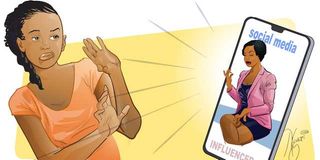
Social media has become a significant influencer in shaping sexual health decisions.
I am not sure which tribe you think has the greatest sexual prowess. Neither do I know your perception of a sexy woman, whether it is a measure of the size of their backside, mammary glands or body weight.
Of course, I am sure you have had it said that a sexy man, on the other hand, is tall, dark and handsome, the definition of handsome sometimes being synonymous with bodily muscular hypertrophy. These opinions are shaped by the popular media.
These thoughts raced through my mind as I talked to Jackie. She had sought services at the Sexology Clinic. She took 10 minutes interviewing me about my qualifications before she could open up about her medical problem.
“I hope you understand my predicament,” she voiced, “we are in a world where everyone is an expert about everything and it is worse in the area of sexuality because those influencing our decisions are not necessarily professionals in sexual health.”
Jackie was nursing the trauma of an experience she had faced a few days earlier. There was a discussion in her social circles about squirting. Many opinions were expressed and one that carried the day was that if you cannot squirt, you are not woman enough.
A social media influencer fronted the opinion, and everyone else agreed with her because her opinions in many other subjects were persuasive making her have a big following.
“And so we agreed to have a ladies’ only retreat in a private place and get a famous promoter of squirting to come and teach us what to do,” Jackie explained.
That retreat turned out to be traumatising to her. The so-called squirting expert took nearly a whole bottle of whisky, smoked weed and lost control of herself. She then removed her clothes and went into a frenzy of masturbation in front of her audience and alas, she splashed on people’s faces!
“It was so yuck! I walked out in protest and rushed to my house to take a shower,” she lamented, “I hope none of us got an infection.”
Jackie’s ordeal is an example of how social media is influencing our sexual decisions. Currently, more than 3.5 billion people in the world use social media.
About 80 percent of topics discussed touch on health. It is known that about 60 percent of Gen Zs make their healthcare decisions based on what they experience in the social media and that 70 percent of them trust information shared by their peers more than other sources of information.
The role of social media and influencers cannot therefore be underestimated when it comes to how people make sexual health decisions.
The concern, however, is that recent research shows that more than 40 percent of sexual health information shared on social media is inaccurate and sometimes harmful. Given the sensitive nature of the subject, not many professionals stick their necks out to correct the misinformation.
“I do not think the professionals are being fair to consumers,” Jackie pointed out, “they should be held responsible for negligence when they allow misinformation on health to spread.”
But social media bullying for people who oppose popular opinion can equally be damaging. Sexual health professionals tend to keep off as a way of guarding their reputation.
Remember that there are many reputable influencers most of whom are non-sexual health professionals but with good standing in their own professional areas.
When they give their opinions on sexual health people take them seriously. They are not necessarily trained in sexual medicine or sex therapy, but they will give advice which their followers take as gospel truth. A sexual health professional opposing such views can have serious bashing.
To avoid mishaps, it is important to validate sexual health information you get from the social media. This does not mean that you are against your social media influencer, it is just that an influencer cannot be an expert on everything.
Secondly, being a respected professional in another field does not make one an expert in human sexuality.
“That is why I found it quite in order for you to interview me about my qualifications before opening up to me on issues of your sexual health,” I told Jackie.
“So, talking about validating information on sexual health, must all women squirt?” Jackie asked, “I have tried everything that people talk about on social media but I am unable to experience it.”
The simple answer is that you do not need to squirt and even if you do it does not have to happen all the time for your sexuality to be complete. Every person is different in the way they experience and express their sexuality.
While it is fine to learn what others experience and while it is okay for you to try a variety of things to enrich your sexuality, your sexual being does not have to be like someone else’s’, influencer or otherwise.









